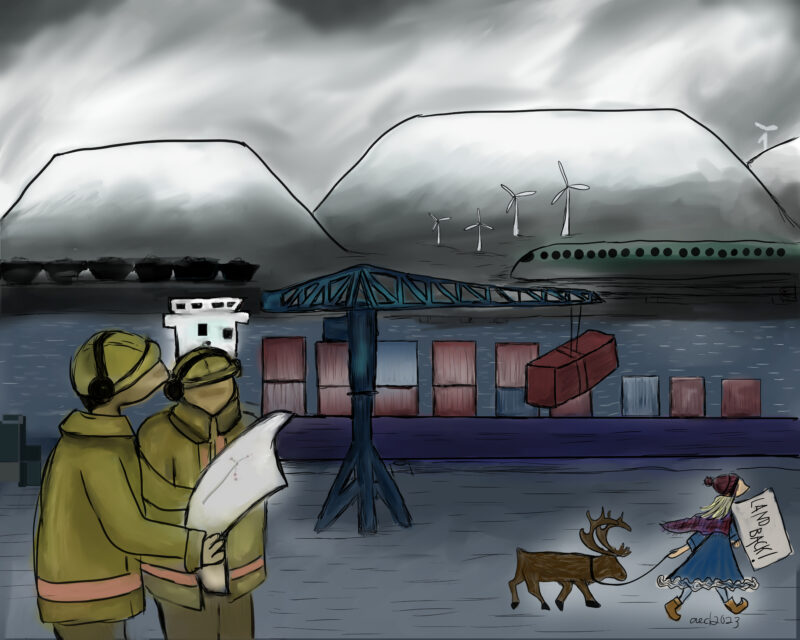“Our children are not keen to come back if society doesn’t develop”
By Aileen Aseron Espiritu
In the Industrial Town scenario, Kirkenes, Sør-Varanger maintains its historical dependence on industrial mining, primarily iron ore, through 2050 and beyond. The region has built its economy around mining for over 100 years, and participants noted that this path seemed closest to the status quo. While mining has deeply impacted the environment and society, its potential for future growth, particularly for the energy transition, was considered crucial:
“I think there will be a lot of minerals that we need for making the green change.”
However, concerns about the sustainability and volatility of mining, given its historical environmental effects, were raised. Participants suggested greener mining practices, such as hydrogen-powered production and electrification, but faced challenges like high electricity costs and the need for significant infrastructure investments.
Participants emphasized the need for economic diversification through education, research, and manufacturing:
“I would prefer an industry like Barel electronics. So, producing of things, not just delivering ore and shipping it to other countries which produce the products.”
Tourism was also seen as a growing industry, with a focus on international visitors, especially from Asia. Collaboration with Finland’s tourism sector, leveraging their expertise in inland tourism, was considered a strategic move to benefit both sides. Infrastructure development, particularly modern seaports, railways, and improved roads, was highlighted as essential for enhancing regional connectivity and reducing emissions. The Northern Sea Route, if politically viable, could also become an important shipping lane, further connecting the region to global trade.
Military presence, which has increased since 2022 due to NATO and border security concerns, was another factor influencing infrastructure development. Some anticipated that military needs would drive the construction of better roads and rail connections, particularly with Finland’s NATO membership, although there were concerns about the social and cultural impacts of such a presence on the local community.
The Sámi population, while historically reduced in the area, is experiencing a revival, and their rights and concerns about environmental protection were integral to discussions. The potential destruction of Sámi culture and traditional lifestyles due to industrial development, such as a new railway project, was a significant concern. Participants stressed the importance of respecting Sámi rights and ensuring that development does not harm the environment or their way of life.
Concerns about depopulation and youth retention were prominent, with a call for better educational opportunities, job creation, and infrastructure to keep young people in the region:
“Without people here, it will be harder to put up a border. And I like being part of Norway, not Russia. We need to find a middle way; having some industries will be necessary to create jobs and keep people in town.”
Participants also noted that without an adequate population, the region would lose essential services, such as healthcare, and face challenges in maintaining a strong economy. Some argued for job opportunities that require higher skill levels to ensure long-term growth and retention.
“We are actually sending out our children somewhere else. And they are not that keen to come back if society doesn’t develop.”
Climate change was seen as both a challenge and an opportunity. While it may attract more people to the region for tourism and living, it also poses risks to traditional industries, like fishing. Participants emphasized that preserving the natural environment was vital, and any future development—whether industrial or tourism-related—must be sustainable and mindful of environmental protection.
Overall, the discussions highlighted the need for a balanced approach to maintaining Kirkenes’ industrial heritage while fostering diversification, sustainability, and respect for both the environment and the Sámi community. Geopolitical considerations, such as NATO’s role and the region’s strategic position, also shaped the future outlook.
